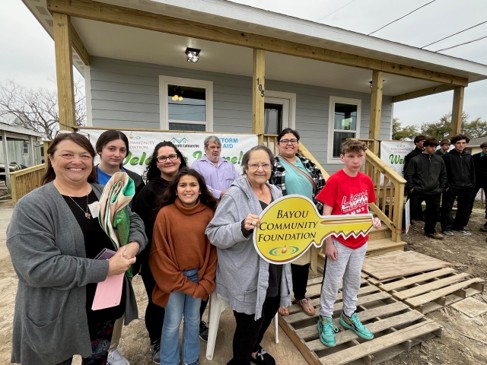Case Study: Empowering Volunteers to Rebuild the Bayou
When Hurricane Ida struck Louisiana in 2021, the devastation to communities in the Bayou region was overwhelming. Families were left without homes, many living in tents or out of their cars, with few resources to begin recovery. The Bayou Community Foundation (BCF), already stretched thin from meeting urgent needs like emergency gasoline distribution, faced the daunting question of how to respond to the region’s most urgent and complex challenge: housing.
It was during this moment of crisis that one of BCF’s committed volunteers stepped forward with a simple but powerful conviction: We have to help people rebuild their homes. What started as a heartfelt reaction to immense need soon grew into an innovative, volunteer-led initiative that has transformed BCF’s capacity to serve. Drawing on his prior experience in project management, this volunteer began brainstorming solutions. At first, he imagined simply supplying building materials to residents, but as BCF discussed the idea with partners, a bigger opportunity emerged—the chance to harness the interest and people power of volunteer groups wanting to come to Louisiana to help, if BCF could organize the effort.
Seizing the moment, this volunteer offered not just ideas, but his own time and expertise to manage the work. From there, “Rebuild the Bayou” was born.
What began as a grassroots response is now entering its fifth year. Acting as project manager, this volunteer still coordinates directly with volunteer teams from across the country. He personally assesses every home, plans projects, communicates with group leaders, and even troubleshoots on-site—whether that means arranging vendor supplies or repairing an electrical outlet himself. And his work has expanded far beyond construction oversight. Partnering closely with BCF staff, he manages budgets, aligns volunteers with community needs, and ensures that each home is completed with care and dignity. In essence, he is serving in a role that could easily be a full-time paid position—yet he continues to do it as a volunteer, motivated by compassion and faith.
The impact of empowering this volunteer has been transformative for BCF. Without him, the “Rebuild the Bayou” program would not exist. Because of his leadership:
- BCF has expanded the number of volunteer teams it can host each year.
- More homes have been repaired or rebuilt than staff alone could have ever managed.
- The geographic scope of the program has grown, reaching families in new communities.
- Staff capacity has been freed to focus on case management, fundraising, and long-term planning.
What began as a seemingly impossible project has become a sustained, multi-year initiative—one that continues to restore hope across the Bayou.
Reflecting on this experience, BCF leaders emphasize the importance of looking at volunteers not only as extra hands but as potential leaders. “We don’t know what we don’t know,” one staff member explained. “By listening to the skills, talents, and passions our volunteers bring, we’ve been able to do things we never thought possible.”
Their advice to other nonprofits: take time to discover the skills within your existing volunteer base, nurture those talents, and invite volunteers into roles that stretch beyond the traditional.
From the volunteer’s perspective, the lesson is just as powerful. Serving in a skilled role can be more than an act of service—it can be a second chance at a career path, a chance to use hard-earned experience in new ways, and an opportunity to make a lasting impact on a community.
Building Capacity, Building Homes
“Rebuild the Bayou” is more than a rebuilding project—it is proof that when nonprofits trust and empower volunteers, extraordinary things can happen. BCF has not only restored homes, but also strengthened its capacity to engage more volunteers and groups, expand its reach, and serve hundreds of families.
And it all started with one volunteer who saw the need, stepped forward, and was trusted to lead.
(Read how Second Harvest Heartland engages pro bono through another case study in our Fall 2025 eNewsletter!)
